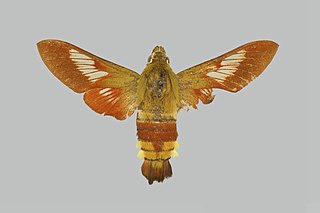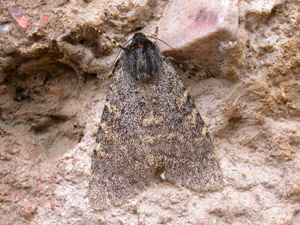
Malacosoma is a genus of moth in the family Lasiocampidae first described by Jacob Hübner in 1820. The larva is commonly called the Tent caterpillar.

Diacrisia sannio, the clouded buff, is a moth of the family Erebidae. The species was first described by Carl Linnaeus in his 1758 10th edition of Systema Naturae.

Acrobasis is a genus of moths of the family Pyralidae.
Talis is a genus of moths of the family Crambidae described by Achille Guenée in 1845.
Metoponrhis is a genus of moths of the family Noctuidae. The genus was described by Staudinger in 1888.

Sphingulini is a tribe of moths of the family Sphingidae. The tribe was described by Walter Rothschild and Karl Jordan in 1903.

Hemaris dentata, the Anatolian bee hawkmoth, is a moth of the family Sphingidae. The species was first described by Otto Staudinger in 1887. It is known from southern Turkey as far west as the Taurus Mountains.

Ancylosis is a genus of snout moths. It was described by Philipp Christoph Zeller in 1839, and is known from South Africa, Uzbekistan, Spain, Turkmenistan, Lebanon, Algeria, Tunisia, Russia, Israel, Palestine, Greece, Australia, Seychelles, Afghanistan, the United States, Iraq, Namibia, Kazakhstan, Iran, Mauritius, Mozambique, Lebanon, Argentina, Sri Lanka, and Yemen.

Anerastia is a genus of snout moths. It was described by Jacob Hübner in 1825 and is known from Egypt and Sudan.

Dicallomera is a genus of tussock moths in the family Erebidae.

Dyspessa is a genus of moths belonging to the family Cossidae. It was described by Jacob Hübner in 1820.

Nossa is a genus of moths in the family Epicopeiidae. The genus was described by William Forsell Kirby in 1892.
Dolgoma cribrata is a moth of the family Erebidae first described by Otto Staudinger in 1887. It is found in eastern Asia, more specifically Russia, China, Korea and Japan.

Carcinopyga proserpina is a moth of the family Erebidae. It was described by Otto Staudinger in 1887. It is found in Uzbekistan, Tajikistan, Kyrgyzstan, Kazakhstan and eastern Afghanistan.
Pelosia angusta is a moth of the family Erebidae. It was described by Otto Staudinger in 1887. It is found in the Russian Far East and Japan.
Pelosia ramosula is a moth of the family Erebidae. It was described by Otto Staudinger in 1887. It is found in the Russian Far East, China and Japan.
Chelis kindermanni is a moth in the family Erebidae. It was described by Otto Staudinger in 1867. It is found in Russia, Mongolia and China.
Cyana adelina is a moth of the family Erebidae. It was described by Otto Staudinger in 1887. It is found in the Russian Far East, Korea and north-eastern China.
Thumatha muscula is a moth in the family Erebidae first described by Otto Staudinger in 1887. It is found in the Russian Far East and Japan.
Chelis ferghana is a moth in the family Erebidae. It was described by Otto Staudinger in 1887. It is found in Central Asia, Afghanistan and possibly Nepal.










